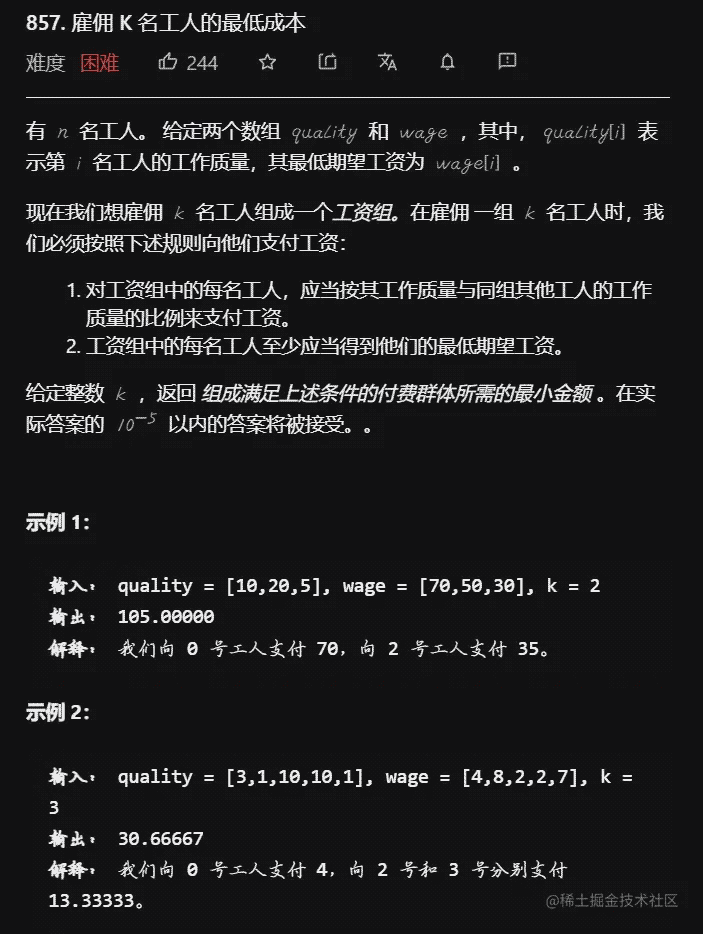Java C++ vector pair
AnjaVon 人气:0题目要求


思路:优先队列 + 贪心

Java
class Solution {
public double mincostToHireWorkers(int[] quality, int[] wage, int k) {
int n = quality.length;
double[][] ratio = new double[n][2];
for (int i = 0; i < n; i++) {
ratio[i][0] = wage[i] * 1.0 / quality[i];
ratio[i][1] = quality[i] * 1.0;
}
Arrays.sort(ratio, (a, b) -> Double.compare(a[0], b[0]));
PriorityQueue<Integer> pq = new PriorityQueue<>((a, b) -> b - a);
double res = 1e18;
for (int i = 0, tot = 0; i < n; i++) {
int cur = (int) ratio[i][1];
tot += cur;
pq.add(cur);
if (pq.size() > k)
tot -= pq.poll();
if (pq.size() == k)
res = Math.min(res, tot * ratio[i][0]);
}
return res;
}
}
- 时间复杂度:O(n log n)
- 空间复杂度:O(n)
C++
学习了一下vector和pair的相互套用,以及自定义排序等内容。
class Solution {
public:
double mincostToHireWorkers(vector<int>& quality, vector<int>& wage, int k) {
int n = quality.size();
vector<pair<double, int>> ratio;
for (int i = 0; i < n; i++) {
ratio.emplace_back(wage[i] * 1.0 / quality[i], quality[i]);
}
sort(ratio.begin(), ratio.end(), [](const pair<double, int> &a, const pair<double, int> &b) {
return a.first < b.first;
});
priority_queue<int> pq;
double res = 1e18;
for (int i = 0, tot = 0; i < n; i++) {
int cur = ratio[i].second;
tot += cur;
pq.emplace(cur);
if (pq.size() > k) {
tot -= pq.top();
pq.pop();
}
if (pq.size() == k)
res = min(res, tot * ratio[i].first);
}
return res;
}
};
- 时间复杂度:O(n log n)
- 空间复杂度:O(n)
Rust
use std::collections::BinaryHeap;
impl Solution {
pub fn mincost_to_hire_workers(quality: Vec<i32>, wage: Vec<i32>, k: i32) -> f64 {
let (mut res, mut tot, mut pq) = (f64::MAX, 0, BinaryHeap::new());
let mut ratio = quality.iter().zip(wage.iter()).map(|(q, w)| (*w as f64 / *q as f64, *q as f64)).collect::<Vec<_>>();
ratio.sort_by(|a, b| a.0.partial_cmp(&b.0).unwrap());
for (a, b) in ratio {
tot += b as i32;
pq.push(b as i32);
if pq.len() as i32 > k {
tot -= pq.pop().unwrap();
}
if pq.len() as i32 == k {
res = res.min(a * tot as f64);
}
}
res
}
}
- 时间复杂度:O(n log n)
- 空间复杂度:O(n)
加载全部内容